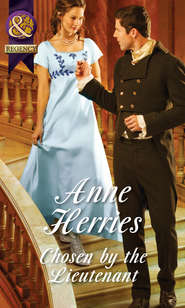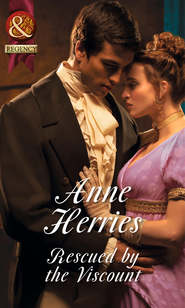По всем вопросам обращайтесь на: info@litportal.ru
(©) 2003-2024.
✖
Marianne and the Marquis
Настройки чтения
Размер шрифта
Высота строк
Поля
‘Joshua Hambleton,’ Lady Edgeworthy said and looked thoughtful. ‘In truth I do not know him well, for he had never visited me until a little under a year ago. He is a very quiet, unassuming man, Marianne. He comes down regularly now, and he stays with me then, but his visits are normally no longer than a few days. I dare say you may meet him while you are residing with me.’
‘I shall look forward to it,’ Marianne said and looked round as the door opened and a lady came in. She was neither young nor old, but in her middle years; tall and slender, she had light brown hair and eyes. She was dressed plainly, but Marianne thought that she might have looked more attractive if she had dressed her hair in a softer style. She stood up and went forward to greet her great-aunt’s companion. ‘How are you, Miss Trevor?’
‘I am very well, Miss Horne. It will be nice for Lady Edgeworthy having you to stay. I think sometimes we are too quiet here and she feels the lack of company.’
‘You do yourself no justice, Jane,’ Lady Edgeworthy told her with a slight frown. ‘I am content with your company most of the time—but I have been wanting to see my great-niece for ages. I believe you were no more than fifteen when I last visited your home, Marianne?’
‘The same age as Lucy is now,’ Marianne told her. ‘She is so pretty, Aunt. Jo made her a redingote of blue velvet just before I left home, and it suited her so well. We trimmed her best bonnet with matching ribbons and a bunch of blue forget-me-nots.’
‘How charming,’ Jane Trevor said, taking her seat. ‘It must be nice to have sisters to share one’s pleasures with, Miss Horne. I had a brother, but I have not seen him since he ran away to sea as a boy.’
‘Mama and Papa longed for a boy, but instead they had three girls to plague them,’ Marianne said and laughed, because it always made her happy to think of her family. ‘Jo wishes she were a boy, but I’m afraid that she must be bound by the rules of society as we all are. If she had been the son Papa wanted, I think she might have been a lawyer or a surgeon for she is very clever.’
‘Ah, yes, that reminds me,’ Lady Edgeworthy said and looked at her companion. ‘I must ask Doctor Thompson for some more of that peppermint cordial he so kindly made up for me. It certainly helps my digestion.’
‘I shall make a note of it and ask him when he calls on Friday.’
‘I thought you were better now?’ Marianne asked.
‘Oh, Doctor Thompson comes to tea each Friday,’ Lady Edgeworthy told her placidly. She glanced at her companion. ‘We have known each other many years, and he is a pleasant gentleman—is he not, Jane?’
‘Oh…yes, I suppose so,’ Miss Trevor said and blushed. ‘He was very good to you when you were ill this spring, and I think his remedies have helped you considerably.’
‘Yes, well, I dare say they have,’ Lady Edgeworthy said and sighed. ‘I do not feel quite as I ought…’ She shook her head and looked at Marianne. ‘But I am sure I shall improve now that you have come to stay, my dear.’
‘I do hope so,’ Marianne said, though privately she thought that perhaps loneliness rather than illness had caused her great-aunt’s low spirits. She had retired to this isolated estate in Cornwall, cutting herself off from many of her friends and acquaintances, which was a little sad. In London, she might still have gone into company had she wished.
‘Take Marianne upstairs, Jane,’ Lady Edgeworthy said. ‘We should all change for dinner soon, though it will be just the three of us this evening—but that is no excuse for lowering standards, is it?’
‘No, indeed,’ Marianne agreed. She stood up and accompanied the companion from the room, glancing at her curiously once they had left the pretty parlour where her great-aunt still sat. ‘Was Lady Edgeworthy very ill?’
‘It was a nasty chill,’ Jane Trevor said and looked thoughtful. ‘I think she is much better in herself, but she has not recovered her spirits. I do not know why. She thinks a lot of her life as it was years ago and it makes her unhappy.’
‘Does she not go out in company?’
‘Very seldom,’ Jane replied. ‘I do not think she has left the house, other than to walk in the gardens, since last Christmas. Her friends and neighbours call to see her now and then, and she did have a dinner party last time Mr Hambleton was staying, but that was two months ago.’
‘It is hardly surprising if she is in low spirits,’ Marianne said. ‘We must see what we can do to cheer her, Miss Trevor.’
‘Please call me Jane…if you wish…’ Jane’s face went pink.
‘Yes, of course. There is no reason why we should be formal with each other,’ Marianne said. ‘I should be happy to do so if you will call me by my name?’
‘Thank you,’ Jane said and looked pleased. ‘It will be nice to have young company in the house.’
Marianne nodded, for she wished to be on good terms with her great-aunt’s companion. ‘You must tell me the best place for walking here, Jane. Aunt Bertha warned me that the cove can sometimes be dangerous.’
‘Oh, yes, I should stay well clear of that if I were you,’ Jane told her, a flash of alarm in her eyes. ‘It is very dangerous—and there are plenty of beaches just round the corner from there where you may walk safely. If you would care for it, I shall show you how to reach the safe beach in the morning—but there are pretty walks on the estate. We have some lovely rhododendrons, though of course they are over for this year—but you may find it more pleasant to walk on the cliffs, for the views are spectacular on a clear day.’
‘Yes, I dare say I may, for sand always gets into one’s shoes, does it not?’
They had reached Marianne’s room and parted as she went inside. It was a large bedchamber, furnished in shades of green and blue with a hint of white here and there. The silk bedspread was made of green quilted silk and very handsome, as were the drapes at the windows, the sofa and stool covered in a deeper shade of blue. Matching chests stood at either side of the bed, and a dressing table with an oval mirror standing on top were placed in front of the window to the right, while a small writing table occupied the similar space before the window to the left. Because of the two windows, it was light and airy.
Marianne’s few possessions had been unpacked, her combs, brushes and scent bottles placed on the dressing table. However, there were silver trinkets littering the tops of occasional tables and some handsome Chinese vases filled with dried flowers helped give the room an air of richness and comfort. Her dresses had been unpacked and were carefully laid on the shelves of the armoire.
Marianne chose one of her older gowns, thinking she would save her new ones for when they had company. She had begun to change when a knock at the door heralded one of Lady Edgeworthy’s maids, who inquired if she could help her dress.
‘Thank you, but this dress buttons at the front,’ Marianne told her. ‘I may need help another evening if we are entertaining, for my best gown is fastened at the back.’
‘Would you like me to dress your hair, miss?’
‘Thank you, Ruby,’ Marianne said. ‘I should like to put it up on top, if you please.’
She took her seat at the dressing table, allowing the maid to dress her hair in a smooth double knot at the back of her head, smiling and thanking her when she was finished.
After the girl had left, Marianne glanced at the little silver watch that she wore from a pin on her gown. Papa had given it to her for her seventeenth birthday and she treasured it. It was now ten minutes to six and she went to gaze out of the window before going downstairs. Her view was mostly of the gardens, but in the distance she could see the cliffs—and a house outlined against the sky. It was completely alone, as if it had been built for the use of someone who needed to be near the sea—perhaps the captain of a ship? She imagined the sea captain’s wife standing at her window, looking for the sails of her husband’s ship, and then laughed at herself. More likely it was the coastguard’s house. She knew that on occasion smuggling went on along this Cornish coast, and the house would be ideal for a Revenue officer, though of course her aunt would not permit smuggling in her cove.
She had far too much imagination for her own good! Which was undoubtedly why she had found the gentleman with the intensely blue eyes creeping into her thoughts at the oddest of times.
Hearing a gong sounding within the house, Marianne went downstairs. She found that Aunt Bertha and Jane had already gathered in the drawing room, and dinner was about to be served in the small dining parlour.
Rising early the next morning, Marianne went out to explore the countryside surrounding her great-aunt’s estate. It was warm and still that day, the sea calm, almost flat as Marianne walked along the edge of the cliffs. She stood for a few minutes, looking out towards the sea, watching as some gulls landed on a protrusion of rock a little way from the shore. In rough weather the rocks would be surrounded by foaming water and probably invisible from a ship. It was not surprising that so many ships foundered in these waters.
Something caught her eye in the cove below. A man had appeared from nowhere and was walking towards a small boat that had come inshore. She was too far away to be able to distinguish the man’s features as he waded out to it, but there was something about his appearance that she found odd. He was clearly a seaman, and that in itself was not surprising, but it was the cap he was wearing on his head…the style of it was unusual. It seemed to be made of some material that fitted snugly to his head, hanging down in a sort of tail at the back—and it was red…
It was the style of cap often worn by the French revolutionaries! Marianne recalled the sketches she had seen in one of her father’s newspapers. He had showed it to her because there was a long article about the rights of man and the French revolution.
The man had got into the boat and was being rowed away from the shore. Marianne stood watching as it pulled away. Now that she looked, she could see that a sailing ship was moored out in the bay, clearly waiting to pick up the man she had just seen. Where had he come from—and who was he?
Marianne frowned as she turned away. She did not think the man was a Cornish fisherman, nor that his ship was a small fishing vessel. She thought that both the man and his ship looked French, though she had only her instinct to guide her. She had seldom been to the seaside and had seen very few ocean-going ships, but she had seen pictures in her father’s books and journals.
What was a French ship doing in the bay at this hour? It was early in the morning, but if it were an enemy ship it ran the risk of being discovered by the Revenue men. It was almost sure to be a smuggling vessel if it were French, she thought, wondering why it had not sailed under cover of darkness. Of course, it might be perfectly innocent…
Glancing to her right, she saw that she was not alone in watching the ship. Another man was standing near the house she had seen from her bedroom window, and he was looking out to sea through his spyglass. At that moment he turned his head to look at her. From something in his manner, she felt that he was annoyed to see her there, but he made no move to approach her or to speak to her. And, as she watched, he shut the glass and moved away, clearly intending to climb down the rocky face of the cliffs to the cove below. Recalling her great-aunt’s warnings, she called out to him.
‘Be careful, sir. The cliff is unstable and the cove can be treacherous.’
He glanced at her and shook his head, frowning as he saw her, but he did not speak, making a gesture that she took to mean he did not wish her to speak or follow him. Marianne felt a spurt of annoyance. She had merely been trying to help him.
Going to the spot where the steep path was just about passable, she watched as the man descended safely to the beach below. His face was hidden from her, her view only of the top of his head as he climbed down the dangerous cliff face. At the moment only a thin line of sand was visible, and she wondered if that was the reason that the ship had risked being seen in daylight. Perhaps it was only possible to take someone off when the tide was in?
Suddenly, the man with the spyglass disappeared. He was there and a second later he had gone…completely disappeared from her view. For a moment she was puzzled, and then she realised that there must be a cave somewhere in the cove. The French seaman had come from it, and the man with the spyglass had disappeared into it!
Turning away, back to the house, Marianne was thoughtful. Something was going on in her aunt’s cove, but what ought she to do about it? If smugglers were landing contraband there, she ought to report it to the Revenue—but was her great-aunt aware of what was happening?
She knew that many people who lived in the area did know about the smugglers, and some of them turned a blind eye in return for a barrel of brandy left in their barns. She did not imagine that Aunt Bertha would be one of them, for her husband had been a Justice of the Peace, but she could not be sure.
She would ask about the occupant of the house on the cliffs, because if he were a Revenue officer he would not want interference from her—and for the moment she would say nothing of what she had seen to anyone but her great-aunt. But one day, when the tide was out and it was safe, she might go down to the cove and see if she could discover the cave for herself.











